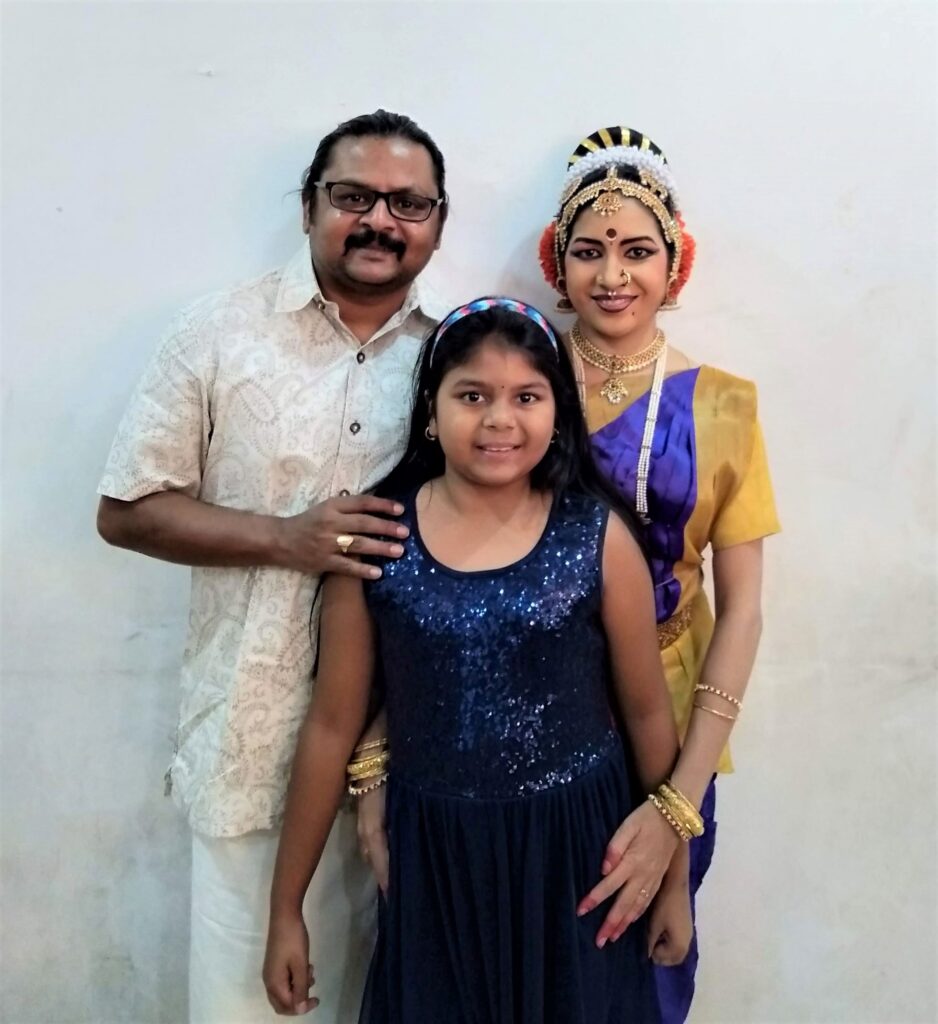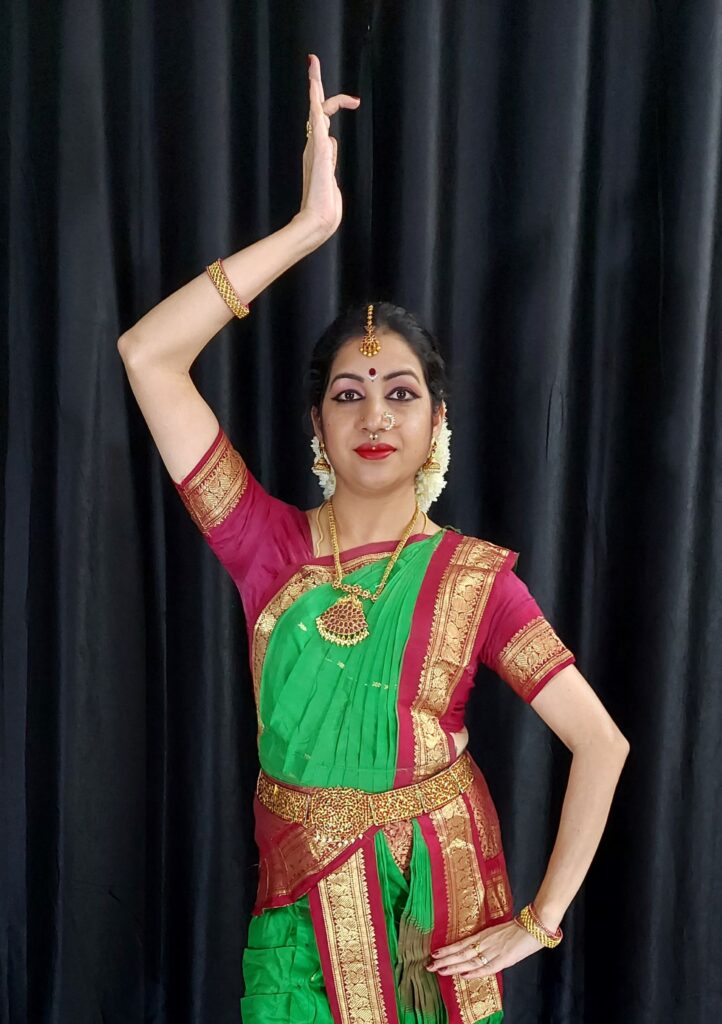
Aparna Dhulipala, who is pursuing full-time Ph.D. from Department of Dance, University of Hyderabad, under the able guidance of Dr. Anuradha Jonnalagadda, researching in ‘Kuchipudi Dance Form during the 21st Century’, confesses that her more than two-and-a-half decades of dance journey has been gratifying. “There have been highs and lows, a couple of breaks from active participation. But I think, I can distinctively divide my journey into two phases – before my Masters in Dance from UoH and after my Masters from UoH,” she says.
According to her, one major learning during this journey was understanding that dance is just not performance but encompasses many other disciplines, igniting passion towards dance research. “All big and small achievements keep me motivated – winning the Gold Medal in the 7th National Youth Festival (my first major achievement), A Grade accreditation from Doordarshan, Graded Artist Department of Culture, winning awards in various competitions, performing in various prestigious national and international venues, my first paper presentation and publication are always my cherished moments. As a teacher, I fondly remember introducing my daughter to Kuchipudi, training her and my other students, their first stage performance – all unforgettable memories,” says the Kuchipudi dancer.
Aparna states that Kuchipudi tradition and repertoire is built on its unique musicality, based on Carnatic music, with its moorings in Yakshagana Sampradayam, the distinct rhythmic patterns and jathis, and the element of dramatization at its core, elevating the saatvikabhinaya. “Understanding these basics and framework is critical for all those engaged with the art form – just usage of a few adavus or movement vocabulary, costume, and makeup, does not qualify a performance as Kuchipudi. One needs to understand that a tradition is much more than just the superficial things,” she says.
Enrolled in dance by mom: Just like the scenario with many children, even Aparna was initiated into dance by her mother. She shares that her mother, an avid reader of Telugu literature has interest in music, dance, and arts in general and enrolled her into a dance class near her home. “I was initiated into the Kuchipudi Institute ‘Nrutya Darpana’ founded by Dr. Mudapaka Venkateswara Rao, popularly known as Dr. Ardhanareswaram Venkat. Under his tutelage, I learnt for almost 14 years, until I shifted to Bangalore. In all those years, neither a thought of going to a different teacher nor learning any other dance form really crossed my mind,” she says. When asked why Kuchipudi and not Bharatanatyam, Aparna says: “Well never thought of it. Being a Telugite, I guess I took to Kuchipudi naturally and the love for Kuchipudi continues. Basically, I grew up in Hyderabad and Kuchipudi was predominantly prevalent during my childhood. Having working parents it was convenient for me and them to enroll me in a dance class which was closer and in a safe zone from my home,” she says.

Aparna’s learning with Venkat Sir was mostly during her formative years. She says that the training focused on the performing aspects. “He is highly practical and ensures that his students are independent from the very beginning. I used to perform a lot while training with him and I remember how protective he was of us and taught the art of makeup even before we were 12. This aided me to be independent and gave me confidence to give multiple performances (local and outstation) especially as my parents were working and couldn’t accompany me always. These performances included solos and dance dramas, which gave me a lot of stage experience, opportunity to portray various roles. He also guided me through the Certificate and Diploma courses,” says the A Graded Doordarshan artist.
Classes with Anu Ma’am: The dancer states that it was in the University of Hyderabad, after joining MPA in Dance, she started learning from Anu Ma’am. “This was a stage of my life where I was more matured as a person and was equipped with critical thinking and analytical abilities owing to my education and work experience. The importance and the necessity of the theoretical aspects of Dance became evident due to the Master’s program at HCU. The training intertwined the shastra and prayoga (theory and practice), unraveling the deeper layers of the essence of dance,” she says. Quickly adds that in a university it is not possible for the professors to give individual attention to all the students. “But Anu Ma’am gave individual inputs and feedback to mold ourselves into better dancers. These learnings multifold with my continuation of practice with Anu Ma’am. She mentors us to bring perfection in the performances by guiding us in understanding each aspect (music, movement, abhinaya, costume, makeup, stage, lighting, audiences) of dance. She also inspires us in the way we train our students. I should say it is a very humbling experience,” admits the research scholar.


Aparna considers herself privileged and fortunate to train under Prof. Anuradha Jonnalagadda in theory and practice. “I think I have never met a person as principled as Anu Ma’am. She mentors us on how to be objective about our research and encourages us to find our own voice and build our thinking capacity. Whether in theory or practice, she is a perfectionist. Her practical classes, preparation for seminar or lectures (her own or helping the students prepare), are very methodical and she doesn’t leave anything incomplete. Her keen observation, and her ability to find the strengths of her students are true blessings to her students. Anu Ma’am always walks that extra mile when the need or situation demands,” she says.
For Aparna, Anu ma’am is her go-to person for anything. “Her abilities to distinctly distinguish the personal and professional spaces is exemplary and is something to aspire for. And this discipline is pleasantly contagious and is instilled in us too. I work with her on many things but am always conscious and careful of not mixing the two.”
Not An Easy Task: Efficiently scaling both academics and passion, Aparna admits that it’s not easy to always manage both the things. “One of them takes a backseat for a while, and the other becomes the front runner and then things would reverse. I should thank my parents for inculcating and instilling the multi-tasking and balancing capabilities. Since childhood, my father always insisted not to neglect my studies and not to choose dance as the only option for livelihood. My parents allowed me to continue learning dance as long as I gave importance to my formal education too. So, from my teenage years, I have been diligent enough to strike a balance between my academics and passion. Fortunately, my husband also understands my love for Kuchipudi and gives me encouragement and support. Thus, I was able to continue academics and passion even after my marriage and childbirth,” she says.

Aparna reveals that she completed MBA after marriage and went into the corporate world. “After few years of working and having a child, I personally was unhappy with the amount of time and energy I could devote to my passion. Quitting the corporate world and getting back to my passion was a turning point in my life,” she says quickly adding: “I enrolled into MPA in Dance in Hyderabad Central University, which changed my perspective and understanding of Dance completely and what it meant to me. It made me realise the academic angle to the performing arts, which to a large extent combines both theory and practice.” She says it was not easy, many conflicting situations arose. “In fact, as one grows older, it becomes tougher, the support from Family, Gurus and Friends gave me the needed strength to balance my life. Above all, I believe it’s the willpower and determination that is most needed,” says the Kuchipudi dancer.
Portrayed Divine Characters: In her dancing career, Aparna has portrayed many woman characters like Parvati, Alamelumanga, Durga and Satyabhama, she shares that each one of these characters are unique in their own way and very interesting to portray. “Though they all are divine and strong characters, the context and the narration differentiate them. Bhamakalapam holds a special place in Kuchipudi and takes both the artists and the audiences on an emotional roller coaster ride. Demanding the portrayal of varied bhavas, Bhamakalapam, in my opinion is the most challenging and also most gratifying,” she says.
The dancer finds it interesting to do both solos and ballets. “Both provide ample scope for an artist to grow in terms of learning and experience. A solo artist owns the stage completely; it also demands sustained perfection in all aspects of Nritta and Abhinaya that can hold the audience. While dance dramas provide an advantage of working with large groups, broader themes, and varied characters. Interestingly, Solos are challenging for a performer and dance dramas for a choreographer,” points out Aparna.

On teaching dance to youngsters, Aparna states that she is teaching few youngsters in the community where she stays. She says that today’s generation is very smart. “They are quick learners and quite inquisitive. But I must also say that many of them are confused about learning the traditional art forms. We cannot blame them completely. This generation has too much to explore, too many activities and a lot of pressure on education. Yet, some are successful in finding their interests and holding onto them. They are to be guided properly. We must applaud their efforts,” she says.
Learning Another Art Form: When queried another art form she would learn if given a chance, she was quick to say – Carnatic Vocal. “It moves me beyond any emotion. I also feel that learning Carnatic or rather any musical art form makes one a better dancer. One should understand music and nuances of music to be an efficient performer or a choreographer,” says the dancer.
On the cultural scene in Hyderabad, she says, it has not been very encouraging. “Owing to the pandemic, it has not got any better. The city needs more venues and avenues, sabha programmes and rasikas. It is now in the hands of our younger generation to put our voices and ideas together and revitalize the environment,” she says. The Kuchipudi exponent advice to the youth is that whatever field one chooses, there will be challenges, failures, and successes. “Being persistent is the key. One must also work with complete commitment and conviction. And a right mentor will protect you from falling into pitfalls and guide you in the correct direction,” says Aparna, before signing off.

We have always known Aparna for her immense passion towards Kuchipudi dance form and her impeccable inclination towards Hindu traditions and other arts..
We wish her all the very best for her future accomplishments..
May god bless this versatile personality with health joy and bliss
From
Loving friends circle..
Dear daughter
Hearty congratulations on your achievements 👏✨🙌 we are very proud and happy.
Amma Naanna.
I am proud to say that You are my friend. You are a great dancer and performer. And I wish you a great and successful journey ahead in your life!
-Yamini